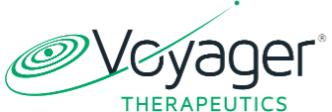Financial Guidance
| ● | Based on the Company’s current operating plan, Voyager anticipates cash, cash equivalents and marketable debt securities will be between $150 million and $170 million at the end of 2020. |
| ● | Voyager expects that its cash, cash equivalents and marketable debt securities, as well as amounts expected to be received for reimbursement of development costs from Neurocrine Biosciences, will be sufficient to meet Voyager’s projected operating expenses and capital expenditure requirements into mid-2022. |
About Voyager Therapeutics
Voyager Therapeutics is a clinical-stage gene therapy company focused on developing life-changing treatments for severe neurological diseases. Voyager is committed to advancing the field of AAV gene therapy through innovation and investment in vector engineering and optimization, manufacturing, and dosing and delivery techniques. Voyager’s wholly owned and partnered pipeline focuses on severe neurological diseases for which effective new therapies are needed, including Parkinson’s disease, Huntington’s disease, Friedreich’s ataxia, and other severe neurological diseases. For more information on Voyager Therapeutics, please visit the company’s website at www.voyagertherapeutics.com or follow @VoyagerTx on Twitter and LinkedIn.
Voyager Therapeutics® is a registered trademark, and TRACER™ is a trademark, of Voyager Therapeutics, Inc.
Forward-Looking Statements
This press release contains forward-looking statements for the purposes of the safe harbor provisions under The Private Securities Litigation Reform Act of 1995 and other federal securities laws. The use of words such as “may,” “might,” “will,” “would,” “should,” “expect,” “plan,” “anticipate,” “believe,” “estimate,” “undoubtedly,” “project,” “intend,” “future,” “potential,” or “continue,” and other similar expressions are intended to identify forward-looking statements. For example, all statements Voyager makes regarding Voyager’s ability to deliver patient imaging data to the DSMB for the RESTORE-1 Phase 2 clinical trial, the review of such data by the DSMB prior to year-end, and pending the DSMB’s evaluation of such data the resumption of enrollment in the RESTORE-1 Phase 2 clinical trial; the submission by Neurocrine Biosciences of an expedited safety report relating to the RESTORE-1 clinical trial in a timely manner; Voyager’s efforts to work with the FDA to resolve additional information requests relating to the IND application for VY-HTT01, the clearance of the VY-HTT01 IND application by the FDA and the initiation of a Phase 1b clinical trial of VY-HTT01; Voyager’s continuing efforts in the discovery and engineering of novel AAV capsids, including progressing non-human primate studies of selected novel capsids; the contributions that will be made to Voyager by key senior level officers and a new member to the Voyager Board of Directors; the timing, progress, activities, goals and reporting of results of Voyager’s preclinical programs and clinical trials and its research and development programs; the potential clinical utility of its product candidates; Voyager’s ability to add new programs to its pipeline; the regulatory pathway of, and the timing or likelihood of its regulatory filings and approvals for, any of its product candidates; Voyager’s anticipated financial results, including Voyager’s available cash, cash equivalents and marketable debt securities; Voyager’s ability to fund its operating expenses with its current cash, cash equivalents and marketable debt securities through a stated time period; and the ability of Voyager to maintain a high level of business critical activity and maintain a level of scientific leadership during the COVID-19 health crisis are forward looking statements.
All forward-looking statements are based on estimates and assumptions by Voyager’s management that, although Voyager believes such forward-looking statements to be reasonable, are inherently uncertain. All forward-looking statements are subject to risks and uncertainties that may cause actual results to differ materially from those that Voyager expected. Such risks and uncertainties include, among others, the ability to provide imaging data to the DSMB for the RESTORE-1 Phase 2 clinical trial, and the ability for the DSMB to complete its evaluation and to resolve questions that may exist regarding such patient data; the ability for Voyager to meet the information requests of, and to resolve questions raised by, the FDA
